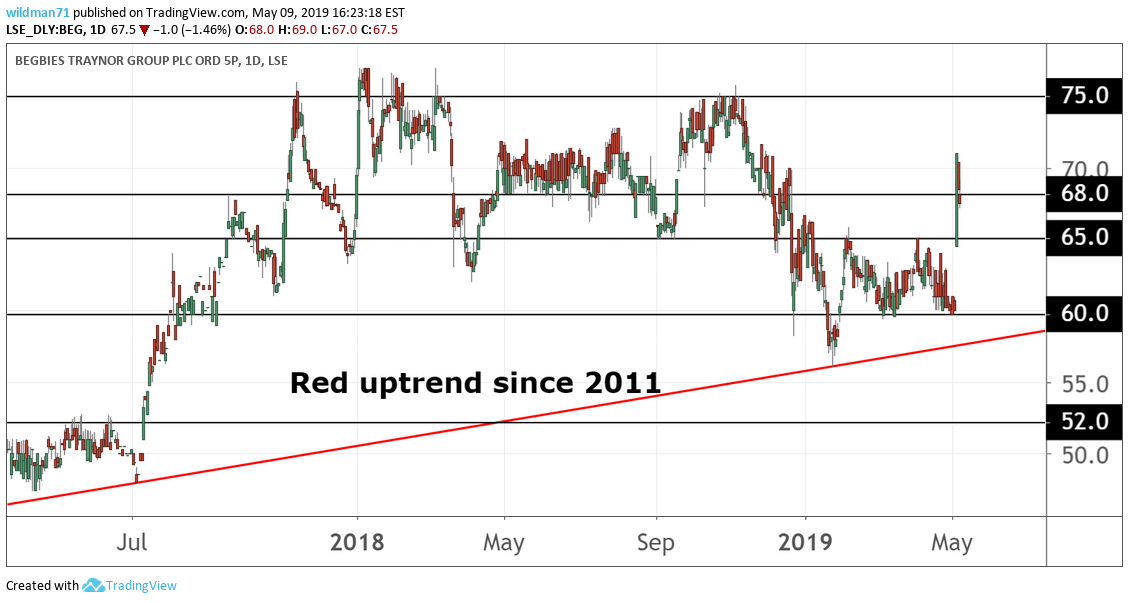Stockwatch: This AIM share is a hedge against recession
Critical financial distress among UK companies is rising, which should line the pockets of this firm.
10th May 2019 08:11
by Edmond Jackson from interactive investor
Critical financial distress among UK companies is rising, which should line the pockets of this solid AIM-listed firm.

Is the UK financial environment worsening enough to spawn profit warnings?
On 29 April, the first quarter 2019 "red flag alert" from AIM-listed corporate insolvency and recovery group Begbies Traynor Group (LSE:BEG) cited a 17% year-on-year rise in the number of UK businesses in critical distress – often a precursor to formal insolvency – while 484,000 or 14% of UK businesses were in significant distress, especially property.
Stealing a term beloved of some plc's reporting, however, you could regard this as an "improvement" as Begbies' fourth quarter 2018 red flag alert showed a 25% year-on-year leap in critical distress levels to 481,000 after a winter of uncertainty. That hasn't exactly triggered an outbreak of warnings, although clearly there are concerns if the UK's financial health is deteriorating.
Cash boost for insolvency/recovery work
Proving its credentials as a contra-cyclical stock, on 7 May Begbies declared a strong performance in the final quarter of its financial year to end-April, saying revenue and profit will be comfortably ahead of expectations. That's an upgrade since 5 March (in respect of the three months to end-January) when trading and the outlook were declared "in line".
Management did however continue a theme from the 19 December 2018 interims when "a number of contingent fee engagements" were for due completion. It now mentions "a number of successful fee realisations...cash collection significantly ahead of our expectations." So quite whether things are bunching together or asserting a genuine change in trend, although there's "continued strong performance from both operating divisions" i.e. business recovery/advisory and property services.
- This share's time is approaching
- Like AIM and small-company shares? Check out ii’s Super 60 recommended funds
I've drawn attention to Begbies since 44p in April 2014 as a hedge against monetary stimulus easing (and an eventual recession), though I never imagined how long central bankers would maintain it. A risk with ultra-low interest rates persisting is that authorities have little means to counter the next downturn unless embarking on another massive round of quantitative easing (QE). The uncertainties make it worth keeping portfolio hedges in mind.
Affirms recent scope for profit upgrades
Last February, when substantiating a 'buy' stance on Begbies at 63p, I mooted scope for upgrades as Brexit and credit stresses took their toll on corporate UK; that normalised earnings per share (EPS) of at least 5p should be considered rather than the 4.3p projected for the latest financial year (presumably by Canaccord the company's broker, as Company REFS cites just one estimate).

Source: TradingView Past performance is not a guide to future performance
I suggested a second-half year performance bias, especially on the business recovery/financial advisory side, also supported potential for "EPS of at least 5p and trending higher" – a scenario the latest update seems to affirm.
The stock still just bumped along, even easing to 60p just before the update prompted a jump to over 70p, and 68p currently. Most likely, investors wonder how durable are the prospects and also about its presentation of "adjusted" earnings where Begbies removes transaction costs from making acquisitions, additional to amortisation of intangibles arising (the difference between net assets and price paid), which is fair in terms a business performance comparison if unrealistic in terms of genuine costs a listed company has incurred in its development.
For the six months to 31 October, such transaction costs were £1.4 million, or 41.6% of £3.4 million operating profit, then also a £1.1 million amortisation charge. Admittedly, transaction costs were high for that period - only slightly lower for the entire year to April 2018 - but expensing the cost would have meant around £2 million pre-tax profit (subtracting amortisation) instead of £3.2 million on an "adjusted" basis, for EPS of 1.3p instead of 2.2p – 41% lower.
Thus, while tables convey a prospective price/earnings (PE) multiple in the low teens for Begbies, it's more realistically in the high teens alongside a prospective dividend yield of around 4%, albeit no real tangible asset backing. This could be justified however if the cycle of financial stress is early-stage and will pick up, so keep an eye on Begbies' updates.
| Begbies Traynor Group - financial summary | Consensus estimates | ||||||
|---|---|---|---|---|---|---|---|
| year ended 30 Apr | 2014 | 2015 | 2016 | 2017 | 2018 | 2019 | 2020 |
| Turnover (£ million) | 44.1 | 45.4 | 50.1 | 49.7 | 52.4 | ||
| IFRS3 pre-tax profit (£m) | 4.3 | -0.7 | 0.9 | 0.6 | 2.3 | ||
| Normalised pre-tax profit (£m) | 5.2 | 2.2 | 0.8 | 0.7 | 2.3 | 1.6 | 2.3 |
| Operating margin (%) | 14.3 | 7.2 | 3.4 | 2.6 | 5.1 | ||
| IFRS3 earnings/share (p) | 3.7 | -0.6 | 0.4 | 0.2 | 0.2 | ||
| Normalised earnings/share (p) | 4.8 | 2.4 | 0.3 | 0.2 | 1.3 | 4.3 | 4.9 |
| Price/earnings multiple (x) | 53.1 | 16.0 | 14.1 | ||||
| Annual average historic P/E (x) | 9.4 | 16.8 | 98.3 | 210 | 138 | 36.3 | |
| Cash flow/share (p) | 6.1 | 3.9 | 6.4 | 5.2 | 6.6 | ||
| Capex/share (p) | 0.4 | 1.3 | 0.5 | 0.3 | 0.4 | ||
| Dividends per share (p) | 2.2 | 2.2 | 2.2 | 2.2 | 2.3 | 2.6 | 2.7 |
| Yield (%) | 3.7 | 4.1 | 4.3 | ||||
| Covered by earnings (x) | 2.2 | 1.2 | 0.2 | 0.1 | 0.6 | 1.7 | 1.7 |
| Net tangible assets per share (p) | 8.6 | 3.1 | 1.7 | -0.4 | 0.1 | ||
| Source: Company REFS | |||||||
Property squeezed even before interest rates may rise
In the first quarter of calendar 2019, property showed a 13% year-on-year rise in significant financial distress, with companies engaged in buying/selling/letting up 16% if only to the same level a year before.
Slower sales and falling prices are grating against developers/investors' tendency to employ substantial debt, also lured during the ultra-low interest rate years. It may only need a minor uptick in rates combining with a sluggish market to cause further trouble. The Bank of England Governor is now cautioning UK interest rates will need to rise by more than expected to combat inflation.
The UK may just be one country among many where the property cycle is rolling over. While it's a tad tricky applying the experience of AIM-listed property services group Purplebricks Group (LSE:PURP), its latest update does convey the UK market is not so bad as Australia and the US which is starting to wobble, hence a "strategic review and potential scaling back" of its business there.
The UK market simply remains "challenging", which I see as a stand-off between property buyers and sellers (clinging to belief in historic prices and refusing to lower), while Brexit uncertainties drag on.
Profit sharing with litigation finance fund
An interesting snippet – though one which hasn't been formerly announced – is Begbies involvement with AIM-listed Manolete Partners (LSE:MANO), a leading UK insolvency litigation company which has completed some 275 such cases with values ranging from £20,000 to £65 million.
Since listing in December 2017 it has attracted a lot of attention and buys situation cases outright - those with a profit share also. Begbies is thought to be one of the largest sources, which is logical. Thus, as litigation finance gains wider acceptance, this is potentially another angle to Begbies' cash flows, if slightly tricky to predict.
The chief determinant of Begbies' prosperity remains whether the UK economy stalls or picks up, assuming some kind of resolution on Brexit, and also more hawkish Bank of England comment implies underlying strength, not just inflationary risks, to justify its shift in stance on interest rates. But, if US/China trade tensions create an impasse which conflates with already low confidence in the eurozone, the UK won't be immune. Despite insufficient evidence for a recession coming, there never is.
It's possible to conjure a variety of stances here: if you don't hold and are otherwise exposed to UK equities, in need of a hedge, then 'buy', especially if markets continue to fall and the latest news impact abates.
If you've already followed my bullish pieces then 'continue to hold'. Broadly, I think the economic cycle must be due some extent of downturn in the next two years, and, despite questioning Bebgies' treatment of acquisition costs, it is well-positioned to benefit. Thus overall: Accumulate.
Edmond Jackson is a freelance contributor and not a direct employee of interactive investor.
These articles are provided for information purposes only. Occasionally, an opinion about whether to buy or sell a specific investment may be provided by third parties. The content is not intended to be a personal recommendation to buy or sell any financial instrument or product, or to adopt any investment strategy as it is not provided based on an assessment of your investing knowledge and experience, your financial situation or your investment objectives. The value of your investments, and the income derived from them, may go down as well as up. You may not get back all the money that you invest. The investments referred to in this article may not be suitable for all investors, and if in doubt, an investor should seek advice from a qualified investment adviser.
Full performance can be found on the company or index summary page on the interactive investor website. Simply click on the company's or index name highlighted in the article.
Disclosure
We use a combination of fundamental and technical analysis in forming our view as to the valuation and prospects of an investment. Where relevant we have set out those particular matters we think are important in the above article, but further detail can be found here.
Please note that our article on this investment should not be considered to be a regular publication.
Details of all recommendations issued by ii during the previous 12-month period can be found here.
ii adheres to a strict code of conduct. Contributors may hold shares or have other interests in companies included in these portfolios, which could create a conflict of interests. Contributors intending to write about any financial instruments in which they have an interest are required to disclose such interest to ii and in the article itself. ii will at all times consider whether such interest impairs the objectivity of the recommendation.
In addition, individuals involved in the production of investment articles are subject to a personal account dealing restriction, which prevents them from placing a transaction in the specified instrument(s) for a period before and for five working days after such publication. This is to avoid personal interests conflicting with the interests of the recipients of those investment articles.